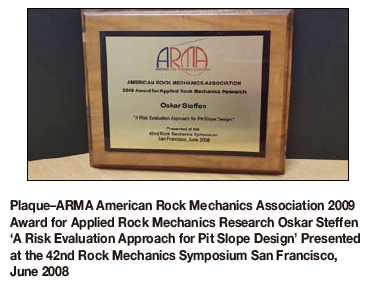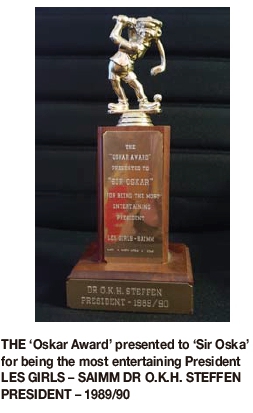Services on Demand
Article
Indicators
Related links
-
 Cited by Google
Cited by Google -
 Similars in Google
Similars in Google
Share
Journal of the Southern African Institute of Mining and Metallurgy
On-line version ISSN 2411-9717
Print version ISSN 2225-6253
J. S. Afr. Inst. Min. Metall. vol.118 n.7 Johannesburg Jul. 2018
Obituary - Oskar K.H. Steffen 1940-2018

There have been many descriptions offered of Oskar Steffen over the years: a statesman, a leader, a gentleman, a giant. He was all these things, and in the mining sector he became a legend on the strength of his knowledge, experience, and skilled professionalism. But perhaps the most important gift he gave was his respect for human dignity - which shone through not just in his personal relationships, but in business and the way he helped build SRK Consulting into a global business of the highest repute.
Oskar was born in Swaziland in 1940 and came to Johannesburg in 1956 to study civil engineering at the University of the Witwatersrand, where he gained his undergraduate degree in 1961, followed by a Master's degree in 1963. An early sign of his intellect and tenacity was that he spoke little English when he began university, having grown up and been to school in an Afrikaans-speaking environment. Another indicator was his swift progress in the workplace; starting work at Nchanga Consolidated Copper Mines in Zambia as shift boss, he was open pit manager by the time he left in 1969 to lecture in soil mechanics and foundation engineering at Wits.
It was no surprise, then, that in 1974 he ventured out with colleagues Andy Robertson and Hendrik Kirsten to form the Johannesburg-based firm of consulting engineers Steffen, Robertson and Kirsten - now a household name in the global mining sector but with reach and expertise well beyond the minerals industry.
So involved and well respected was the firm - and Oskar in particular - in the mining industry that he became President of the SAIMM in 1989-1990, perhaps one of the few presidents who were not mining engineers. It mattered not; Oskar was a mining man heavily involved in the day-to-day challenges of mines locally and abroad. He also had a far-sightedness that sought and found solutions that delivered inestimable financial benefit to the industry as a whole.
In his Presidential Address to the SAIMM in 1989, Oskar demonstrated this vision by touching not just on issues of demand for engineering skills and higher productivity, but on environmental protection and entrepreneurship in mining. In words that in retrospect encapsulate the modern approach to sustainability, he said: 'Since the costs of all projects are ultimately recovered from the community for which they were undertaken, an over-engineered project may be just as damaging to the community as one that is under-engineered.'
He looked ahead to the evolution of South Africa's mining sector, and seemed to foresee the rapid changes that would remould its corporate character so fundamentally during the 1990s. In his 1989 SAIMM address, he also noted: 'The relative stability of our mining industry has resulted in secure and complacent attitudes over many years, which, by definition, are counterproductive to entrepreneurial development.'
One of his professional cornerstones was his teacher - and later colleague and mentor - at the Wits School of Mining Engineering, Professor Jere Jennings. An important collaborator in the evolution of Oskar's ideas on rock slope stability, Professor Jennings also shared, and doubtless encouraged, Oskar's people-centred approach.
These attitudes in many ways formed the cultural foundation of the world-class company that SRK Consulting was to become, encouraging a broad-based ownership among the strong contributors and securing their longterm commitment to the business. This was vital in creating a company that would embrace the changes of 1994 and transform its ranks in terms of gender, diversity, and age.

The SAIMM went on to bestow upon Oskar, in 1995, one of its highest honours: the Brigadier Stokes Memorial Award for 'the very highest achievement' in mining. Announcing the award, Rick Mohring (SAIMM President 1997-8) described Oskar as 'the complete engineer' - who was 'concerned about the potentiality of failure- and risk-evaluation methods, balancing this side always with cost.' Mohring said that the SAIMM recognized him for 'a combination of intellect, energy, professionalism, and humanness.'

In all this, Oskar was remarkable for his humility. Many people who knew him commented on his lack of 'ego' - often a rare attribute among mining men of his calibre. No less a feature was Oskar's sense of humour, which helped him maintain a sense of perspective even in the many challenging situations his work required him to face.

Family, friends, and colleagues alike will all miss Oskar deeply, but we are comforted by the fact that his positive legacy continues in the lives and outlooks of everyone who encountered this extraordinary gentleman-engineer.
J.R. Dixon














